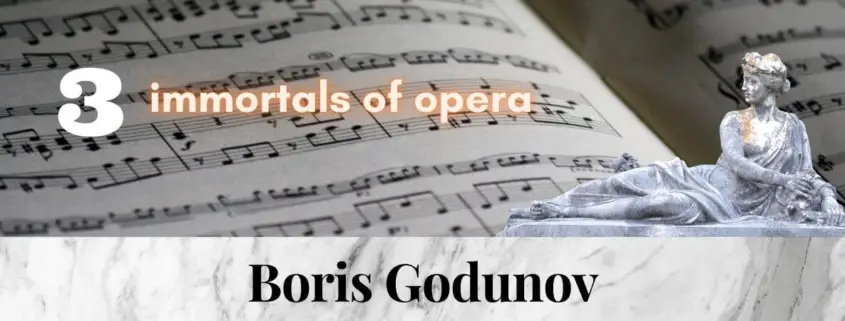With Boris Godunov, Mussorgsky wrote a unique opera, a monolith of opera history. The most Russian of all operas thrills with great music and fascinating scenes and became the Russian national opera. Many of his musical ideas became the inspiration of a new generation of artists decades later.
The drinking song of the mendicant
We hear the peppy drinking Cossack song in the 1954 Soviet Russian TV version worth watching.
Kak vo gorode (To Kazan it was in the old fortress)
The Great Madness Scene
This scene from Boris Godunov is one of the greatest madness scenes in opera literature. It is also called the Clock Scene because the chimes in Godunov’s room begin to move on the hour, and in them he believes he recognizes the dead ghost of Dmitri. We watch the shocking decline of the king, who at times can only stammer. It is no longer one of Verdi’s or Donizetti’s mad scenes with coloratura and leaps of tone but the declamation becomes spoken theater. Mussorgsky enhances the effect by using repeated tritoni, depicting Godunov’s unstable state.
Shalyapin, as the prototype of the singing actor, was the most famous and renowned bass of the first half of the 20th century, singing in all the great opera houses (he did not perform in the Soviet Union after 1921). Boris Godunov was his parade role, and his embodiment of this role in the 1908 production was instrumental in helping this opera achieve an international breakthrough.
Uk tyazhelo (Oh, I’m choking) – Shalypin
The stage death
Once again the bells ring out, and once more the Tsar rears his head. The chorus of monks can be heard, they are his conscience and he realizes that his last hour is approaching. Boris is only a shadow of his former self and only manages to stammer words. Suddenly a consoling melody from the depths sets in and peace returns to the dying tsar. Low clarinets and bassoons accompany him to his death, the music turns major and ends in a comforting mood.
Zvon! Pogrebal’ny zvon! Hark! (Hark, a bell tone) – Talvela / Banjewicz







Leave a Reply
Want to join the discussion?Feel free to contribute!